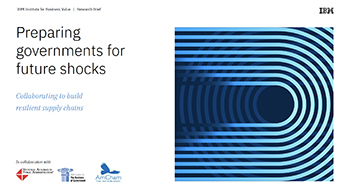
Preparing governments for future shocks: Collaborating to build resilient supply chains

During the last three years, a perfect storm of natural and geopolitical events has disrupted worldwide supply chains in ways that few governments could have anticipated. Even as nations, businesses, and consumers strive to normalize, new interruptions have created bottlenecks in an enormously complicated and interconnected system of purchasing, operation, distribution, integration, and consumption.
In a 2022 survey, 38% of global CEOs reported that supply chain disruption is one of their greatest challenges. And now, the impact of supply chain disruptions on national economies and social systems is driving government leaders to also put a top priority on building supply chain resiliency.
What is the role of governments in preparing for supply chain disruptions that impact government services, national defense, and national economies? How can governments foresee potential challenges, plan responses ahead of time, and be ready to minimize the impacts?
The IBM Center for The Business of Government, the IBM Institute for Business Value, the National Academy of Public Administration, and the American Chamber of Commerce (AmCham) in the Netherlands jointly sponsored roundtable discussions on “Preparing for Future Shocks: Modernizing Supply Chains.” These events, held in Washington, DC, and Rotterdam, brought together leaders and experts from government, business, academia, and the nonprofit sector to share learnings and develop practical and actionable recommendations for governments.
During the roundtables, the participants discussed the need for governments to establish a shared service center of excellence to develop protection against supply chain disruptions. After establishing these supply chain risk management organizations, governments should have the centralized resources to diagnose threats, design responses, sustain supply chains, and mitigate disruptions by building supply chain immunity.
Read the report and listen to the interview on Federal News Network.



